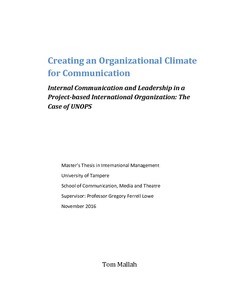Creating an organizational climate for communication : internal communication and leadership in a project-based international organization : the case of UNOPS
Mallah, Tom (2016)
Mallah, Tom
2016
Master's Degree Programme in Media Management
Viestinnän, median ja teatterin yksikkö - School of Communication, Media and Theatre
This publication is copyrighted. You may download, display and print it for Your own personal use. Commercial use is prohibited.
Hyväksymispäivämäärä
2016-11-15
Julkaisun pysyvä osoite on
https://urn.fi/URN:NBN:fi:uta-201611172597
https://urn.fi/URN:NBN:fi:uta-201611172597
Tiivistelmä
Background: Managers in project-based international organizations struggle to recognize the dynamics between work contexts, which in turn shape organizational climate and employee interactions. Accordingly, decentralized international organizations increasingly need to address internal communication gaps between headquarters and country-level offices to ensure long-term development.
Purpose: Effective internal communication has been linked with supporting international management and enabling organizational outcomes including employee engagement and change management. Yet, few empirical studies focus on organizational climate and its relationship with effective internal communication within international organizations. Accordingly, this thesis explores the link between organizational climate, leadership and effective internal communication within one international organization, the United Nations Office for Project Services.
Methods: A qualitative approach relying on a case-study strategy was used to probe which contextual aspects impacted the flow of effective internal communication within UNOPS. Qualitative data was collected from 12 semi-structured interviews with UNOPS personnel from eight different countries. In addition, direct observations and internal document analysis were integrated to enrich the findings.
Results: The thesis argues that organizational climate significantly impacts effective internal communication within international organizations. The case study findings confirm a strong relationship between management leadership, the perception of organizational trust and people's willingness to engage in an open and clear manner. More importantly, effective internal communication was directly influenced by how consistent executive, senior and middle managers were with their actions and words. In addition, effective two-way communication was linked with the perceived clarity of roles. The thesis also supports that the internal communication criteria of relevance, clarity, sincerity, credibility and reciprocity as proposed by Zaremba (2006), Drucker (2007) and Marques (2010), are proportionately related to leadership. Furthermore, the findings show a positive relationship between effective internal communication and change management, as espoused by Kitchen & Daly (2002) and Bharadwaj (2014).
Purpose: Effective internal communication has been linked with supporting international management and enabling organizational outcomes including employee engagement and change management. Yet, few empirical studies focus on organizational climate and its relationship with effective internal communication within international organizations. Accordingly, this thesis explores the link between organizational climate, leadership and effective internal communication within one international organization, the United Nations Office for Project Services.
Methods: A qualitative approach relying on a case-study strategy was used to probe which contextual aspects impacted the flow of effective internal communication within UNOPS. Qualitative data was collected from 12 semi-structured interviews with UNOPS personnel from eight different countries. In addition, direct observations and internal document analysis were integrated to enrich the findings.
Results: The thesis argues that organizational climate significantly impacts effective internal communication within international organizations. The case study findings confirm a strong relationship between management leadership, the perception of organizational trust and people's willingness to engage in an open and clear manner. More importantly, effective internal communication was directly influenced by how consistent executive, senior and middle managers were with their actions and words. In addition, effective two-way communication was linked with the perceived clarity of roles. The thesis also supports that the internal communication criteria of relevance, clarity, sincerity, credibility and reciprocity as proposed by Zaremba (2006), Drucker (2007) and Marques (2010), are proportionately related to leadership. Furthermore, the findings show a positive relationship between effective internal communication and change management, as espoused by Kitchen & Daly (2002) and Bharadwaj (2014).
